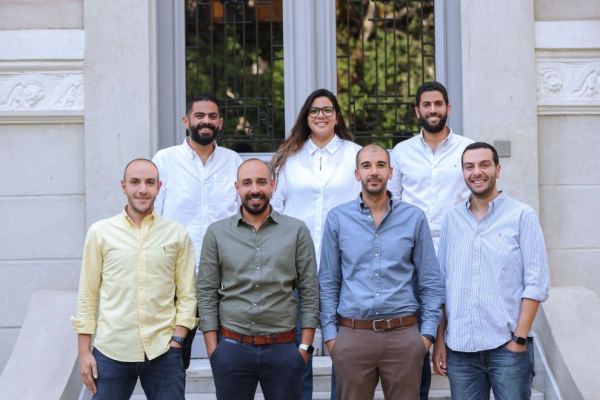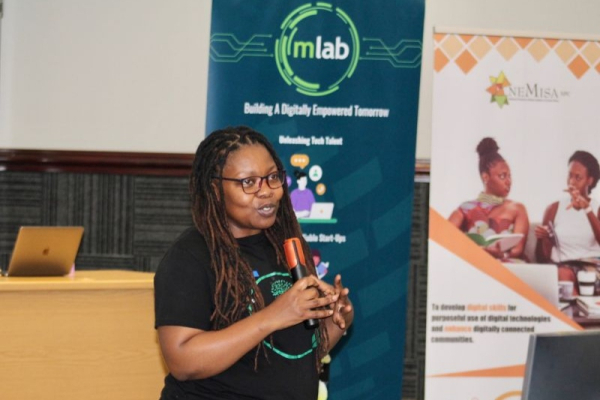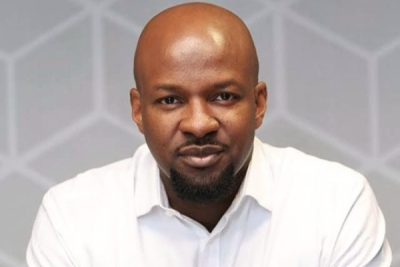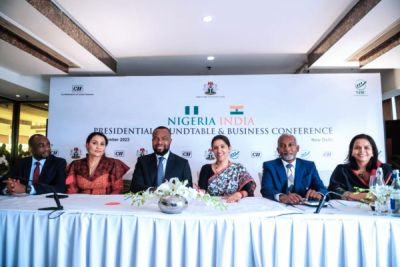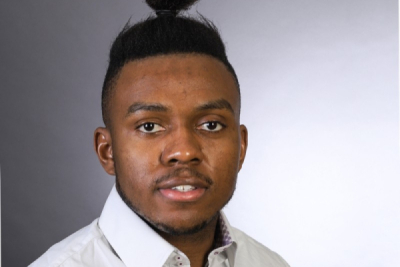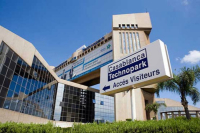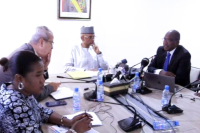The number of e-commerce platforms is increasing in Egypt, and competition for market share is fierce. Although based in Cairo, this start-up has decided to conquer other cities in the land of the pyramids.
Kenzz is an e-commerce platform developed by an Egyptian startup. It enables users to shop online at competitive prices without going through intermediaries or resellers. The Cairo-based start-up was founded in February 2022 by Ahmed Atef, Mahmoud Al Silk, and Moataz Sami. In October of the same year, it raised around $3.5 million to accelerate its growth in the domestic market.
"We’re going after a completely different segment that Amazon and the big platforms are not looking at as they are centralized in big cities and towards the people who are comfortable buying online. [...] What we’re doing is bringing that experience much closer to the masses and building a reliable, trustworthy e-commerce platform that caters specifically to the mass market, solving for the barriers to buying, whether it’s trust, affordability, and relevance while capitalizing on social engagement and social interaction aspects of e-commerce," explains Ahmed Atef.
Through the Kenzz mobile app –available for Android and iOS devices, users can create accounts with their phone numbers and access the various stores on the platform. Whether for groceries, clothing, home and sports goods, household appliances, or even books, Kenzz has stores specialized in all of those items and more.
It allows users to make group purchases, with friends or family, for up to 65% discounts. Currently, the startup has chosen to develop activities in secondary cities in Egypt. For the time being, Play Store data show rapid growth as the Android version of its app has been downloaded more than 100,000 times.
Adoni Conrad Quenum
Through its unwavering commitment to innovation, mLab Southern Africa is positioning itself as a catalyst for digital transformation in Southern Africa.
mLab (Mobile Applications Laboratory NPC) Southern Africa, founded in 2011, is a technology-focused company that trains innovators and entrepreneurs to make the most of digital opportunities.
It is the result of a collaboration between the World Bank, via its InfoDev project, the Department of Science and Innovation (DSI), the Council for Scientific and Industrial Research in South Africa (CSIR), and The Innovation Hub (TIH), among other stakeholders, to help open up and develop the mobile applications sector in South Africa.
It is part of a regional initiative encompassing Southern African countries. In addition to the members of the consortium that set it up, it relies on a solid network of partners and collaborators from the public, private, academic, and civil society sectors. These include the World Bank, the Finnish Ministry of Foreign Affairs, AfriLabs, Google, and Amazon Web Services.
Along with various partners, it strives to build a dynamic and robust innovation ecosystem. It focuses on empowering youth, women, and disadvantaged communities through digital skills training, business support, and technology development services.
With offices in Limpopo, Gauteng, and the Northern Cape, it offers a wide range of services and programs to support both aspiring technology entrepreneurs and established players in developing their skills, ideas, and products.
It organizes events, training, workshops, and bootcamps for a variety of audiences including school pupils, university students, graduates, professionals, and entrepreneurs wishing to learn about mobile technologies, design, development, and business management.
mLab Southern Africa successfully runs the CodeTribe program, a full-time coding academy designed to train young people from disadvantaged backgrounds to become software developers.
The company offers incubation and acceleration programs for early-stage startups. Through its programs, it offers services such as gap analysis, go-to-market strategies, mentoring, start-up grants, as well as assistance with digital tools and minimum viable product (MVP) development.
Its Innovation Lab is a fertile ground where its team supports the development of digital solutions, particularly those with social impact, and has contributed to the development of solutions for sectors as diverse as education, health, and agriculture.
Melchior Koba
He has over two decades of experience in media, entertainment, and technology. With his new role at Google Africa, he will play a greater role in promoting a digitally inclusive and prosperous future for the entire continent.
Alex Okosi (photo) is a Nigerian-born business executive. Last September 5, he was appointed Managing Director of Google in Africa. At that post, he will lead the company's operations on the continent, including programs to help businesses and economies grow, as well as expand Internet access and provide tools to help the next billion users get more out of the Web.
"I am excited at the prospect of leading Google’s team in Africa and the opportunity to be an even closer part of this diverse and dynamic region, which is so close to my heart," said Alex Okosi. "I’m a firm believer in the potential for technology and, in particular, the internet to improve people’s lives and to help individuals and businesses in Africa to thrive," he added.
The new executive attended university in the United States. In 1998, he graduated from Saint Michael's College with a Bachelor's in Business Administration and Economics. Before joining Google, he spent 22 years (1998-2020) with mass media company ViacomCBS (now Paramount Global). He held several executive positions, including General Manager of the BET International brand. He then worked for YouTube, between 2020 and 2023, as Managing Director of EMEA Emerging Markets.
Throughout his career, Alex Okosi has won several awards. In 2013, he was named Young Global Leader by the World Economic Foundation (WEF). In 2014, he won Up & Coming Future Leader of the Year at the Ai Investment & Business Leader Awards. In 2018, he was a finalist in the All Africa Business Leader Awards. The following year, he was made an honorary member of the National Institute Of Marketing Of Nigeria (NIMN).
Melchior Koba
Nigeria aims to become one of the leaders in the African digital economy. To achieve its goal, it is signing partnerships with countries that share the same objectives.
Nigeria's Minister of Communication, Innovation, and Digital Economy, Bosun Tijani, signed two memorandums of understanding in New Delhi, India, last Wednesday. The first agreement, signed with the Indian Ministry of Electronics and Information Technology, aims to share the best digital solutions that would benefit citizens in both countries.
The second partnership, signed with the Central Square Foundation team, a non-profit organization working to ensure quality school education in India, aims to develop solutions that leverage technology to facilitate education in Nigeria.
“The collaboration between our countries gives us a platform to build on the upward trajectory of digital transformation as a driver of economic growth,” Dr. Bosun Tijani indicated in a post on X (formerly Twitter).
The MoU were signed on the sidelines of the 18th G20 Summit, to be held from Saturday, September 9 to Sunday, September 10 in New Delhi. They come at a time when the Nigerian government is stepping up efforts to attract additional investors to the country, increase funding to support Nigerian innovators and expand resources for local entrepreneurs. With such initiatives, the government wants to create one million jobs in the digital economy and improve digital literacy among the youth.
By choosing India to support those digital projects, Nigeria is making a strategic move. Indeed, in less than 10 years, India's digital penetration rate has more than doubled. In 2015, the world's fifth-largest economy launched "Digital India", an ambitious program to transform India into "a digital society and knowledge economy."
Samira Njoya
The solution behind the startup was established as SmartWage. Later, its founders decided to broaden its offering. So they updated its name.
Jem is a digital solution developed by a South African startup. It enables employers to share documents and information with their out-of-office employees. The Cape Town-based startup was founded, in 2019, under the name SmartWage by Alex Platt, Caroline van der Merwe, Nick Platt, and Simon Ellis. It has raised around $2.5 million to, among other things, support its growth and develop its technology.
"Payslips and leaves are still done manually with paper printouts, while employee communication is done using notice boards or apps, which have huge usage drop-offs. Onboarding and disciplinary procedures are still paper-based, costing businesses precious time, money, and resources," says Simon Ellis.
The digital solution is accessible via WhatsApp instant messaging app, so users won't have to download any apps from the Play Store or App Store. Jem allows users to receive company-wide communications, access payslips, request time off, or even access financial wellness products, all via WhatsApp.
"If we can save employers time and money through digitization, we can bridge the gap between South African enterprises and their frontline employees, helping enterprises connect clearly and dynamically with their employees, whilst offering financial wellness tools at the same time," explains Simon Ellis.
To share payslips via the solution, each employee pays 4.90 rand (approx. $0.26) per month, and to receive all communications, the rate rises to 8.9 rand. The startup also offers access to salary advances that need to be repaid the following month.
Adoni Conrad Quenum
He is an outstanding example of an African entrepreneur who is harnessing blockchain technology to generate a positive impact both on his continent and on the world stage.
Cameroonian-born entrepreneur Ricardo Konlack (photo) is a blockchain enthusiast. As the co-founder and CEO of IoT firm Katika, he is actively involved in revolutionizing the financial landscape in Africa through the adoption of this innovative technology.
His platform, Katika, stands out for its ability to offer innovative solutions perfectly adapted to the needs of African entrepreneurs. It facilitates rapid and secure payments, offers access to credit without the need for intermediaries, encourages savings, and enables investment in local projects.
Katika's mission is to promote financial inclusion, stimulate economic development, and enhance digital sovereignty in Africa. It uses blockchain to establish trust between users, reduce costs, increase transparency, and guarantee data protection. Its platform relies on an active, committed community that contributes to its governance and development.
The platform has benefited from support from several local and international incubators and accelerators, including Founder Institute and ActivSpaces.
Ricardo Konlack graduated from Germany's Technische Hochschule Mittelhessen in 2020, with a degree in civil engineering. The entrepreneur's first company is BrickBuilding, which designs, manufactures, and distributes products for civil engineering, architecture, construction, and public works.
Melchior Koba
SING plays a key role in the digital ecosystem in Gabon and the Central African region as a whole. It provides solutions tailored to the needs of entrepreneurs, businesses, and institutions.
SING (Digital Incubation Society of Gabon) is a private company specializing in digital innovation. Founded in 2018 by business management consultant Yannick Ebibie, it primarily aims to help boost the competitiveness of African businesses by promoting digital transition.
With its PIVOT 4.0 incubator, SING offers customized programs to support the development of digital start-ups. It selects and supports innovative projects in various sectors such as digital, energy, agriculture, health, and education. Start-ups benefit from tailored support, access to state-of-the-art infrastructure, a network of mentors and experts, and financing opportunities.
The incubator also offers training courses leading to qualifications and certification in digital-related fields such as web development, design, digital marketing, and cybersecurity. These courses are accessible at all levels and are designed to enhance learners' skills.
SING also supports companies and institutions in their digital transformation by providing auditing, research, strategy, and customized digital solutions.
Since its creation, SING has supported over 50 digital startups in Gabon, some of which have won national and international awards. In addition, SING has been a key player in the organization or co-organization of digital-related events, such as hackathons, conferences, and workshops. Its ambition is to contribute to the creation of 20,000 jobs in information and communication technologies (ICT) in Gabon by 2025 and to foster the emergence of national digital innovation champions.
Some of the companies it supported include Ultimate CRM, an online prospecting platform designed to improve the sales force, and Ekena, a start-up focused on promoting local tourism through the development of digital solutions for all players in the value chain.
Its partners include the World Bank, Deloitte, eGabon, Gabon Telecom, Vivendi Africa, Total Gabon, and the Ministry of Digital Economy, Communication, and Post.
Melchior Koba
Last Wednesday, Nigerian digital free-zone builder Itana announced it secured $2 million in a pre-seed round led by global venture capitalists LocalGlobe, Amplo, Pronomos Capital, and Future Africa.
The proceeds will support Itana’s efforts to improve the business environment, encourage foreign direct investment, and boost employment in Nigeria.
Technopark is a key player in innovation in Morocco. It helps revitalize the country’s economic fabric and promote youth entrepreneurship.
Launched in 2001 in Casablanca, Technopark is the first technology business incubator to be established in Morocco. It was established by MITC (Moroccan Information Technopark Company), a B2B service company, as a public partnership between the Moroccan Ministry of Industry, the World Bank, the national deposit and consignment fund CDG, Banque Centrale Populaire (BCP), and the now dissolved private equity firm ONA.
Technopark's mission is to facilitate the creation and growth of innovative companies operating in the fields of information and communication technologies (ICT), green technologies (greentech), and the cultural industry. It offers an environment conducive to the growth of start-ups, with a wide range of services including accommodation, mentoring, training, access to financing, market access, visibility, and networking.
Since its creation, Technopark has supported over 3,500 innovative companies, creating more than 15,000 direct and indirect jobs. It currently operates on five sites - located in Casablanca, Rabat, Tangier, Souss-Massa, and Agadir - hosting over 450 companies and regularly serving as a venue for events focused on innovation and entrepreneurship.
The incubator aims to be a strategic catalyst for Morocco's innovative entrepreneurial ecosystem, extending its model to other regions of the country. In the fourth quarter of 2023, Technopark Essouira will be inaugurated, and three other sites planned for Fez, Tiznit, and Oujda will launch in 2024. These new innovation centers will help support local start-ups and foster synergies between the various players in these regions.
Melchior Koba
The National Employers Council of Mali (Conseil national du patronat du Mali-CNPM) will organize the first edition of Salon international du développement accéléré du numérique (SIDAN) in Bamako next November 28-30.
The event, under the theme "Digital Sovereignty and Technological Progress: Vision and Strategies," aims to enable stakeholders in the tech industry to discuss digital issues and the contribution of the digital to the development of Mali.
More...
The solution aims to help people build financial discipline.
Alvin App is a fintech solution developed by a Kenyan startup. It helps users efficiently manage, save, and grow their money.
"The only personal finance apps we could find in Kenya were not optimized for the local context, they offered no guidance to help us acquire the assets we wanted to save toward, and only offered the ability to save but gave no daily support to help us save for goals that require consistency for long periods.[...] Alvin is ultimately designed to be your daily pocket companion that makes it dead simple to feel like you’re in control of your financial situation, and that every day," explains Winston Reid, CEO of Alvin.
Through the Alvin Android app (only the Android app is available for the time being), users can create their accounts and set spending and saving goals to let the app track their budgets. Alvin defines daily, weekly, and monthly spending thresholds, enabling users to track the evolution of their savings.
In addition to setting up the budget, Alvin assists the user daily by sending budget alerts. It also carries out comparative analysis based on current and past spending. The analysis aims to help users build and stick to spending habits that facilitate the achievement of predefined saving goals.
"For anyone to build sustainable saving habits, they need to have sustainable spending habits. And doing this requires giving people more support than reminders to make deposits," says Winston Reid.
In 2022, the startup behind the app raised $740,000 to accelerate its growth. At the time, it indicated that the app was in its private beta phase, adding that it was planning to go international.
Adoni Conrad Quenum
Last September 5, Le Cercle Africain de Cybersécurité (CAC), a regional association aimed at enhancing cybersecurity in Africa, was launched in response to the new cyber threats facing the continent.
The CAC brings together cybersecurity/cyberdefense professionals, government representatives, cybersecurity business leaders, lawyers, and academics. It aims to encourage digital security initiatives, develop a cybersecurity culture and raise awareness on the threats that could impede countries’ economic growth.
With the acceleration of digital transformation across the continent, African countries are compelled to invest in cybersecurity. 18 of the continent's 54 countries have already drawn up national cybersecurity strategies, and 22 have national computer incident response teams (CIRTs).
The lack of investment and weak regulation exposes Africa to cyberattacks, according to the report "Cybersecurity in Africa- A Call to action" published in June 2023 by consulting firm Kearney. Yet investment in the African cybersecurity market is set to rise from $2.5 billion in 2020 to $3.7 billion in 2025, representing a compound annual growth rate of 7.9%.
"Despite this investment, it’s estimated the region loses more than $3.5 billion annually due to direct cyberattacks, and billions more from missed business opportunities caused by the resulting reputational damage from the attacks,” the report says.
To show the continent’s vulnerability to cyberattacks, Kearney tested its cyber resilience –the ability to resist, adapt, and recover from cyberattacks. That test focused on the five African best performers in the International Telecommunication Union's Global Cybersecurity Index: South Africa, Morocco, Nigeria, Kenya, and Egypt.
“Through the five selected countries, the analysis showed that Africa’s cyber resilience is low, particularly around strategy, governance and operational entities and cross-sector cooperation,” the report states.
While the average benchmark is 0.25% of GDP, South Africa, the African champion in cybersecurity spending, invests just 0.19% of its GDP, compared with 0.03% for the rest of sub-Saharan Africa. "If each African country spends 0.25 percent of GDP annually on cybersecurity, this would be in line with spending in mature markets. Our estimates suggest that this translates to $4.2 billion annually for the region," reads the document.
In addition to financial investment, investment in human capital is also an important component. Indeed, 84% of organizations believe that less than 50% of candidates applying for cybersecurity jobs are qualified, and more than half of companies seeking these profiles take more than 6 months to find qualified people.
Against this backdrop, in an interview with We Are Tech Africa last May, Youssef Mazouz, Secretary General of the African Cybersecurity Center, explained that there was a need to support Africa “by setting up continuous training, building skills, and opening cybersecurity research centers and universities."
Regulatory issues
African countries are yet to agree on regulations. Although the African Union convention on cybersecurity and the protection of personal data was adopted in 2014, it is not yet effective to this day. According to Article 36, to become effective, the convention must be ratified by at least 15 of the continent's 54 countries. To date, only 14 have ratified it, the latest being Côte d’Ivoire (March 2023). However, digital transformation has been accelerating on the continent since the Covid-19 pandemic.
“Cybersecurity is not a matter from which African countries can isolate themselves. The interconnectivity of systems results in the interconnectivity of the security threats to member states.[...] The absence of an implemented, unifying, regional governance framework makes it difficult to collaborate and share intelligence,” the report indicates.
Africa will better manage cybersecurity by emulating European countries, which opted for the General Data Protection Regulation (GDPR). That law, effective since May 2018, frames data processing equally throughout the European Union (EU).
Adoni Conrad Quenum
From November 15 to 17, 2023, Dakar, the capital of Senegal, will host the first edition of "This is Africa Digital," an event dedicated to the digitalization of Africa.
According to the organizers, the event will bring together key industry players to explore the opportunities offered by digitization in Africa.


